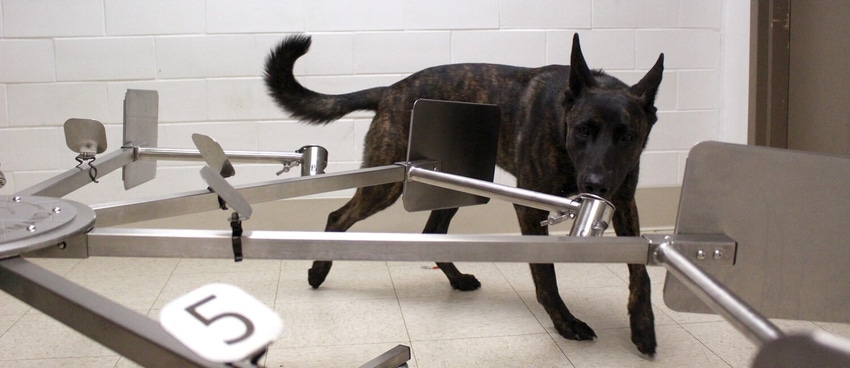Penn Vet to train dogs to detect COVID-19
Canine surveillance could play key role in detecting asymptomatic cases and monitoring hospital or business environments.
April 28, 2020

Researchers at the University of Pennsylvania's School of Veterinary Medicine (Penn Vet) are looking to dogs to help in COVID-19 surveillance programs. Penn Vet said a new pilot training program utilizing scent detection dogs to discriminate between samples from COVID-19-positive and COVID-19-negative patients will explore the sensitivity and specificity of scent in disease detection.
With up to 300 million smell receptors — compared to 6 million in humans — dogs are uniquely positioned to aid in disease detection, Penn Vet said, adding that the "pioneering study" sets the stage for dogs to be a force multiplier in the mission to detect COVID-19, particularly among asymptomatic patients or in hospital or business environments where testing is most challenging.
Preliminary screening of live humans by trained dogs could begin as early as July, the announcement said.
The study is backed in part by the new Penn Vet COVID-19 Research Innovation Fund. The fund, provided with critical startup support through a generous gift from Vernon and Shirley Hill, will bolster Penn Vet’s rapidly expanding research and response program to fight the novel coronavirus.
Penn Vet will initially begin the study with eight dogs to perform this precise detection work. Over the course of three weeks, through a process called odor imprinting, the dogs will be exposed to COVID-19-positive saliva and urine samples in a laboratory setting, Penn Vet explained. Once the dogs learn the odor, the investigators will document that the dogs can discriminate between samples that are positive and negative for COVID-19 in a laboratory setting, establishing the platform for testing to determine if the dogs can identify COVID-19 infection in people.
The U.S. Army Combat Capabilities Development Command Chemical Biological Center will be lending its expertise during the study as well, the announcement noted.
“Scent detection dogs can accurately detect low concentrations of volatile organic compounds, otherwise known as VOCs, associated with various diseases such as ovarian cancer, bacterial infections and nasal tumors. These VOCs are present in human blood, saliva, urine or breath,” said Dr. Cynthia Otto, professor of working dog sciences and sports medicine and director of Penn Vet’s Working Dog Center. “The potential impact of these dogs and their capacity to detect COVID-19 could be substantial. This study will harness the dog’s extraordinary ability to support the nation’s COVID-19 surveillance systems, with the goal of reducing community spread.”
Penn Vet’s COVID-19 Research Innovation Fund is raising funds to support Penn Vet’s research laboratories that are already tackling problems associated with COVID-19.
“Penn Vet is a key part of the biomedical community here at the University of Pennsylvania. We are leveraging our unique and collective expertise in pathogen-related research, infectious disease and translational medicine to fight this pandemic, said Dr. Phillip Scott, Penn Vet vice dean for research and academic resources. “Penn Vet’s COVID-19 Research Innovation Fund is affording us the agility to make immediate and significant strides toward solving this public health emergency.”
You May Also Like


.png?width=300&auto=webp&quality=80&disable=upscale)
